What Courses Are Considered Liberal Art Courses at College

A liberal arts degree includes the study of history, literature, writing, philosophy, folklore, psychology, creative arts and more than. Liberal arts programs are designed to help you formulate compelling arguments, communicate well and solve issues.
Studying liberal arts tin equip you "with a myriad of colors to paint with to create a vibrant career picture," said Torian Parker, a career advisor at Southern New Hampshire University (SNHU). That's considering the degree programs are designed to develop soft skills such as:
- Collaboration
- Creativity
- Critical Thinking
- Effective advice
"With these skills, liberal arts (majors) have a unique opportunity to enter varying career paths through a holistic approach," Parker said. Earning a liberal arts degree can be an constructive way to testify employers you have the skills necessary to be an asset in a range of fields.
What Exactly Does Liberal Arts Mean?
Liberal arts is a wide term that can be cover everything from theater arts to economics.
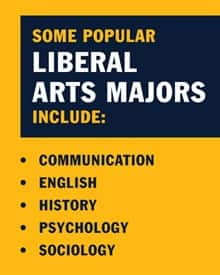
As a bailiwick, these subjects are intended to give y'all general knowledge and the ability to call up critically and learn any subject – instead of specific skills needed for a technical profession. Instead, liberal arts sharpen your enquiry, writing and critical thinking skills.
As to what y'all can do with a degree in liberal arts, the benefits arrive across the specific subject knowledge from a detail degree. When it's fourth dimension to enter the job market, liberal arts majors take a huge array of possibilities available to them, including many in science, technology, engineering and mathematics (Stem) and business concern.
What is a Liberal Arts Degree Good For?
With farther training, nearly all liberal arts degrees can lead to careers in pedagogy, allowing graduates – with the right qualifications – to share their passion with others. These degrees also lend themselves well to further studies and research. Many liberal arts majors are too interested in giving back and connecting with people, which leads them to careers in politics, public service and other helping professions.
These are some of the more traditional paths for liberal arts majors, but graduates can be institute in nearly all industries and professions. Their power to call back critically, accommodate quickly and solve problems is in demand in STEM and business organization fields where liberal arts graduates may find their niche in areas such as marketing, sales, strategy or relationship-driven work such as customer relations and account management.

Liberal arts majors oftentimes know how to connect with others and can excel at adding the "human touch" to whichever field they enter. "Liberal arts (majors) approach issues in the workplace and the world from a unique vantage bespeak by tapping into the humanistic qualities and dynamics at times overlooked due to a narrowed and single approach to problem-solving," Parker said.
What Jobs Tin Y'all Get with a Liberal Arts Degree?
Y'all can look forward to entering a number of careers in business, government, education and healthcare thanks to the transferable skills a liberal arts teaching provides. Below are some pop majors and career paths y'all can consider.
Communication
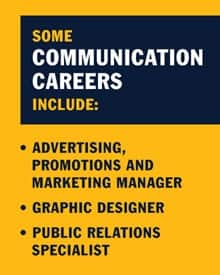
Some jobs in the communications field include:
- Advertising, Promotions and Marketing Manager: Boost interest in diverse products and services across industries as an advertising, promotions or marketing managing director. Professionals in these roles plan paid advertizing campaigns across radio, television, web and other media; develop corporate or production-based websites and create promotional campaigns. The median almanac salary for advertising, promotions and marketing managers was $141,490 in 2020, according to the U.S. Bureau of Labor Statistics (BLS).
- Graphic Designer: Are you lot able to tell a compelling story through infographics and photography? Graphic designers draw upon their inventiveness and creative skills to create visual concepts for corporate websites, media outlets and print publications. They earned a median annual salary of $53,380 in 2020, co-ordinate to BLS.
- Public Relations Specialist: Are you interested in shaping the public perception of a company, organization or product? Drawing upon their potent speaking and writing skills, public relations professionals craft media releases and develop social media programs to increase awareness and measure engagement. They earned a median almanac salary of $62,810 in 2020, according to BLS.
Discover what else y'all can exercise with a communications degree.
English
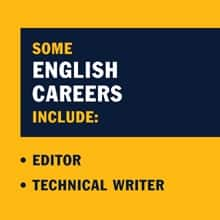
The curriculum is too designed to prepare you for jobs in public relations, film, theater and advertising, to name a few.
Some jobs in the field include:
- Editor: Do yous exhibit strong writing skills and attention to detail? Editors work in a variety of industries and support both print and online publications. They earned a median salary of $63,400 in 2020, according to BLS.
- Technical Writer: Technical writers create instruction manuals, web content and other supporting documents for products and services. They earned a median salary of $74,650 in 2020, according to BLS.
Discover what else you can do with an English degree.
History
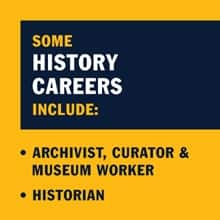
Although history majors often piece of work in politics, they are likewise qualified to piece of work in other roles in business concern, journalism, police or pedagogy. A major in history tin can set y'all for law school, as well.
Some jobs in the history field include:
- Archivist, Curator and Museum Worker: Archivists review, process, catalog and preserve historically valuable records. Curators oversee art collections and historical artifacts and may present their research on behalf of an institution. Museum technicians and conservators restore objects and documents and gear up museum collections and exhibits, according to BLS. They earned a median salary of $52,140 in 2020, according to BLS.
- Historian: Historians research, analyze, interpret and write nigh the past by studying historical documents and sources, according to BLS. You can find work in museums, archives, historical societies and research organizations. Historians earned a median salary of $63,100 in 2020, according to BLS.
Detect what else you can practise with a history degree.
Psychology
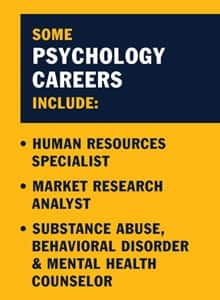
- Human Resource Specialist: If y'all are interested in resolving employee conflicts, interviewing, hiring and retaining employees, yous might enjoy working as a human resources specialist. To be successful, you need strong interpersonal and advice skills. Human resource specialists earned a median bacon of $63,490 in 2020, according to BLS.
Market Research Analyst: Strong analytical and critical thinking skills help market research analysts make up one's mind what products people want, who will purchase them and what price they are willing to pay. They earned a median salary of $65,810 in 2020, according to BLS. - Substance Abuse, Behavioral Disorder and Mental Health Counselor: In this part, you lot can help individuals recover from alcoholism, drug habit, eating disorders, mental health problems or other mental or behavioral issues. They earned a median salary of $47,660 in 2020, according to BLS. Additional instruction and licensure is usually required for these roles.
Discover what else you can do with a psychology degree.
Folklore
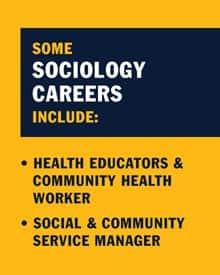
- Health Educators and Community Wellness Worker: To be successful in one of these roles, yous need potent interpersonal and communications skills to develop and evaluate health programs and create materials on diverse wellness topics. Health educators and community health workers piece of work in hospitals, authorities and non-turn a profit organizations. They earned a median annual salary of $48,140 in 2020, according to BLS.
- Social and Community Service Managing director: Working in one of the "helping professions" requires you to identify and evaluate programs that meet the needs of special populations such equally veterans, the elderly or children. You lot may also focus on serving people affected by substance abuse or poverty. They earned a median annual salary of $69,600 in 2020, according to BLS.
Discover what else yous can do with a sociology caste.
What are the Benefits of a Liberal Arts Education?
Pursuing a degree in the liberal arts helps you succeed in a fast-paced world that requires individuals to develop creative solutions today to solve the circuitous challenges of the future.
It'southward no surprise, then, that business organisation leaders are speaking out in defence force of these foundational subjects. Harvard Concern Review looked at 3 books about how the humanities prepare students. Humanities, the books' authors contended, are well-nigh the ability to learn, ask the right questions, identify the real trouble and never lose sight of real human needs.
An Associate of American Colleges and Universities (AAC&U) survey found that the learning outcomes of contemporary liberal pedagogy, including the liberal arts, are valued every bit "somewhat" or "very important" to nine out of 10 employers.

Soft skills are essential to being a good leader, communicator and critical thinker and are often developed in full general instruction courses. The implications of a liberal arts background extend far beyond that, though.
Foreign languages teach another mode to view language itself. This translates into an employee who can move seamlessly between computers, employers and customers, better understanding each perspective, limitations and needs. Philosophy encourages logic and inquiry, which translates into an employee who effectively assesses unexpected situations.
Does Liberal Arts Include Science?
Bones math and scientific discipline are besides function of the traditional arts. The problem solving, assay and observation skills established in those subjects are essential for a lasting career when artificial intelligence (AI) and other new technologies are causing future changes in the workplace.
The Futurity of Liberal Arts in the Workforce
Consider this – the task market changes rapidly, and the virtually in-need skills in the future may very well exist the humanities. Automation and AI are affecting more and more industries. But skills like disquisitional thinking, human relationship-building and storytelling resist automation and will continue to be needed in the workforce.
The Humanities Indicators report from the American Academy of Arts & Sciences shows that the number of humanities degrees conferred in 2018 was 2% below the previous year and 14.1% below the highest number of degrees conferred in a single year – back in 2012. And yet, competencies adult through foundational subjects, such every bit getting a liberal arts degree, thing more than than ever.
Automation and AI accept limits because of unanticipated nuances to a task or its human and emotional elements. AI needs capable humans to manage and pull the best from it.
Today's highly digitized, AI-supported environments have a heightened need for employees with interpersonal skills, nimble minds and the power to piece of work alongside machine learning.
AI is being used to a remarkable effect in most every sector. For example, companies in the healthcare and insurance industries can gather data to determine customers' rates via the Internet of Things (IoT) sensors that capture ane's driving and lifestyle habits. A virtual claims adjuster can even minimize fraud as it handles settlement and payment post-obit an accident.
And yet, a frightened driver calling their auto insurance company from a ditch on the side of the highway wants to speak to a human. That customer service representative must be able to listen sympathetically, gather the relevant data and clearly instruct the driver on immediate next steps. At that moment, the insurance company needs employees with problem-solving and communication skills.

In a medico'south office or hospital, AI can collect and process more than comprehensive and accurate data than a human could ever hope to. But rather than replace the nurses and office administrators, this automated capability frees them to focus on what they do best — educating patients and providing unique support and communication.
Pressure to compete for STEM careers continues to grow in a world increasingly supported by and reliant on technology. Liberal arts studies emphasize enduring skills in an era when technology and automation will increasingly supercede workers, according to Dr. Ruth Lahti, associate vice president of liberal arts and social sciences at SNHU.
Soft skills are however relevant in the workplace, and students who tin demonstrate their inventiveness in areas such as writing, communication, critical thinking and collaboration, volition continue to be attractive to employers. In that location is a growing trend for experts in the "digital humanities," who tin bring digital resource into their inquiry, teaching and publishing to make scholarship more accessible to others, Lahti said.
Preparing for the Workforce
Although they're well-equipped for many dissimilar roles, liberal arts majors may take a less clear-cut route to the perfect job than some graduates. Here are some suggestions for liberal arts majors entering the task market place.
- Build Your Personal Brand: Liberal arts students are adept at storytelling and communicating complex ideas. When information technology's time to enter the job market they need to harness tho
se skills to tell their own story, and they can practice that through establishing a personal make.
- Diversify Your Skill Set: Since liberal arts majors can be helpful in many fields, one way to stand up out from other applicants is to learn new topics and skills transferrable to your industry or system of involvement. For example, if yous're a advice major looking to work for a technology visitor, you might consider building on your vocabulary and understanding of the subject with an Information technology constituent. Yous could besides subscribe to engineering journals to stay upwardly-to-date on industry news.
- Think Exterior of the Box: Exist willing to explore different industries with an open mind and gain new skills and noesis. Publishing houses are not the only employer of English majors; your background and willingness to learn tin exist beneficial in other job markets every bit well. "As a liberal arts major myself, how you utilize your education to your career growth is entirely upward to you," saidRyan Bernier, a benefits specialist at SNHU and former career advisor.
Why Practise Employers Similar a Liberal Arts Education?
In his book, "You Tin Do Annihilation: The Surprising Ability of a 'Useless' Liberal Arts Education," Forbes contributing editor George Anders writes that companies look for five key qualities in potential employees:
- Eagerness to tackle uncharted areas
- Power to solve murky problems
- Well-honed analytic methods
- Swell awareness of grouping dynamics
- Ability to inspire and persuade others
"It just seemed as if there was this tremendous disconnect between public rhetoric that said 'yous've got to get the STEM route and there is no route but STEM,' and then all of these interesting new job openings that were coming up for people with liberal arts degrees," Anders said in a USA TODAY College story. "It was this hidden force of the economy that nobody wanted to write about or talk about."
A degree can change your life. Find the SNHU liberal arts program that tin best assistance you meet your goals.
Rebecca LeBoeuf '18 is a author at Southern New Hampshire University. Connect with her on LinkedIn.
Source: https://www.snhu.edu/about-us/newsroom/liberal-arts/what-is-a-liberal-arts-degree#:~:text=A%20liberal%20arts%20degree%20includes,communicate%20well%20and%20solve%20problems.
0 Response to "What Courses Are Considered Liberal Art Courses at College"
Post a Comment